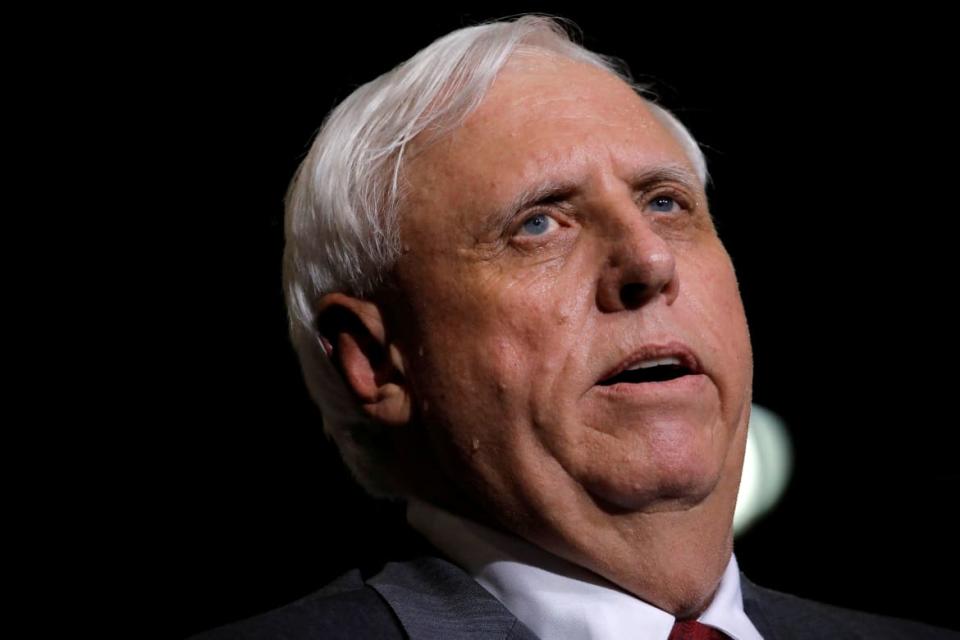Jim Justice Is Trying to Be the GOP’s Version of Joe Manchin

- Oops!Something went wrong.Please try again later.
- Oops!Something went wrong.Please try again later.
There’s an ironic twist to the GOP’s urgent effort to unseat Sen. Joe Manchin (D-WV) in 2024: if Republicans succeed, they might just wind up with their own version of Manchin.
Gov. Jim Justice’s résumé seems designed to make a GOP loyalist break into a cold sweat. He’s a former Democrat who supported the Affordable Care Act. He expanded Medicaid in his state when he was governor. He backed President Joe Biden’s $1.9 trillion stimulus in 2021 before Manchin did, then supported Biden’s $1 trillion infrastructure bill. And he pushed a tax increase into law.
All those factors, plus Justice’s past penchant for running roughshod over his own party in the legislature, sparked no confidence votes, calls for his resignation, and at least one GOP lawmaker to dub him “disturbingly self-centered.”
At the very least, these ingredients might amount to a giant red flag for leaders of the Senate GOP working to assemble reliable Republican votes for a potential majority come 2025—much like how Manchin’s debt-hawkishness, friendliness to fossil fuels, and openness toward Donald Trump made Democrats wary about his potential role in their caucus.
Joe Manchin Has Tortured Dems. Now They Need Him Again.
Instead, Justice is the party’s consensus top recruit to finally wrest this Senate seat away from Manchin, one of the last surviving red state Democrats.
That’s because many Republicans see Justice not so differently from how many Democrats see Manchin: a figure who, for all his exasperating and perplexing moves, has a formidable gift for retail politics and a strong feel for the dynamics of his home state.
“He’s an interesting character, because he’s at least philosophically not unlike Joe Manchin,” Sen. Kevin Cramer (R-ND) said of Justice. “I suspect he’s a pretty good reflection of West Virginia and his political recent history is indicative of that.”
The perception is shared in West Virginia. Greg Boso, a former state senator, said Justice and Manchin “came from the same era, where they both recognized that you have to be able to work across the aisle.”
But the desire to win, and potentially flip control of the Senate, has Republicans casting aside any concern over Justice’s potential to be a headache if elected. Cramer said he had already donated to Justice, preferring him over Rep. Alex Mooney (R-WV), a more traditional conservative who launched his Senate campaign last year.
“I want to win the seat,” Cramer said. “We need more Republicans in the Senate. We want to have the majority.”
Boso, meanwhile, is leaning toward backing Justice—even though in 2019, he publicly pushed for the legislature to hold a vote of no confidence in the governor. “He’d bring a different perspective that would be forward-thinking for our nation,” he said.
Sen. Lindsey Graham (R-SC), who attended Justice’s campaign launch last week, suggested that, if elected, the governor might play a role that Manchin has relished on Capitol Hill: that of bipartisan dealmaker.
“He’s got a record of being conservative but also getting things done,” Graham said, “so I think you'll find him as the guy who will sit down with Democrats and Republicans to try to move the ball forward.”
A representative for Justice did not respond to requests for comment. Approached by The Daily Beast in the Capitol on Tuesday, Manchin declined to comment on Justice. But the senator indicated that he wasn’t looking away from the brewing GOP primary drama.
“I won’t even talk,” Manchin said. “I just want to watch the games, that’s all.”
There are still plenty of unanswered questions in West Virginia, which is the foundation of the GOP’s offensive effort to recapture the Senate in 2024.
For one, it’s unclear whether Manchin will run for re-election, retire from politics, or perhaps mount a third-party bid for president—all possibilities he has not ruled out.
Manchin has said he may not make a decision until the end of the year. A statement he released upon Justice’s entry declared he would “win any race I enter.” Justice, meanwhile, still has to survive a primary fight against Mooney.
But the dynamics between Justice and Manchin are already adding a colorful, very West Virginian dimension of drama onto this election of national importance.
Beyond their stylistic similarities, the two men are both towering figures in state politics. Both have coal business interests. Both were elected governor twice, though Justice won both as a Democrat and then as a Republican. And both are near universally known in the state. Justice, an ultra-wealthy entrepreneur, is also very visible due to his ownership of The Greenbrier, an old-money luxury resort that is a renewed point of pride in the state.

Conrad Lucas, who chaired the state GOP in 2017 when Justice switched parties, recounted a popular saying: “In West Virginia, everything is political except for politics—which is personal.”
“We’re a small state where everyone does seem to have a relationship with one another despite party lines,” he said.
Even in a small state with a tight-knit political scene, Manchin and Justice have a deep personal history. They were known to be friendly for some time, but their relationship suffered in 2018, when Justice fired Manchin’s wife, Gayle, from her position leading the state Department of Education and the Arts.
Justice also issued an endorsement of Manchin’s GOP challenger that year—a late and tepid endorsement, but one that came following reports that Justice had privately told people he supported Manchin.
In recent years, Justice has called Manchin a friend, particularly when defending him from attacks from fellow Democrats. When Manchin became persona non grata after sinking the Build Back Better Act in late 2021, Justice went on Fox News and said the vitriol sent his way was “not tolerated—just period” and said “he stepped up and echoed the people of West Virginia.”
Manchin has returned the favor. In February, when asked by NBC News about the prospect of running against Justice, the senator said he would want to run a positive race.
“I respect whatever he does, and if we end up running against each other, it’ll be a good, strong, competitive race,” he said. “When all [is] said and done, the smoke clears, you still have that personal relationship and friendship you want to make sure you continue.”
Even in his video to launch his campaign for Manchin’s seat, Justice did not even mention the incumbent Democrat by name.
Justice can perhaps relate to Manchin’s experience of being the object of intense criticism and disdain from members of his own party—both Democrats and Republicans.
Joe Manchin: Deeply Disappointed in GOP and Prepared to Do Absolutely Nothing
When he switched to the GOP in 2017—making it official onstage at a rally with Trump, no less—Democrats were obviously outraged. But Justice’s political positions and style of governance quickly rankled West Virginia Republicans.
In 2019, tensions boiled over when Justice fought with GOP lawmakers over his controversial K-12 education reform measure—a battle that took place on top of Republican concerns about Justice’s allegedly poor communication, absence from the Capitol, and questions about his extensive business dealings.
Republican activists pushed for a vote of no confidence in Justice or, in some cases, his resignation. The chair of the Kanawha County GOP, in Charleston, quipped that Justice had committed “random acts of Republicanism;” the state College Republicans said he had “not governed as a conservative Republican with a deep commitment to moving West Virginia forward and defending our values.”
“He’s shown no willingness to build a coalition with either party,” said Ryan Weld, a top state senator, at the time. “When he was a Democrat, he butted heads consistently to members of the Democratic party. He switched to Republican and constantly butts heads and throws us under the bus. Is he a Republican in name only or does he want to govern with those of us who are?”
There are still critics of Justice within the GOP, but he has won over key figures in the revolt that brewed against him in 2019, like Boso, who has since retired from the legislature.
“When you look at what Gov. Justice has done… we’ve really moved the state in a very positive direction,” he said.
Boso said he would back Justice if the primary were held today, but reserved judgment if other candidates entered the race. The conventional wisdom in Washington and West Virginia GOP circles is that Justice is a clear primary favorite over Mooney, a five-term congressman who has aligned himself with Trump as well as traditional conservative forces in the party.
A recent poll testing the head-to-head match, conducted by another statewide campaign, found Justice with 57 percent of the primary vote to Mooney’s 25 percent, according to numbers shared with The Daily Beast.
However, Mooney’s deep-pocketed allies at the conservative group Club For Growth are promising to spend lavishly on his campaign. On Tuesday morning, the Club launched an attention-grabbing ad focused on Justice’s debts and allegations of not paying employees, scorching him as a “deadbeat.”
Elsewhere, Mooney and his allies have predictably hit Justice as a “RINO”—or Republican In Name Only—hoping to ding his standing with the conservative primary electorate.
Some Democrats look at the determination of Mooney’s backers, and Justice’s weak spots, and don’t understand the hype. Republicans have “overplayed their hand that this is a great get for them,” said Jonathan Kott, a former top adviser to Manchin. “Justice has a very tough road to beat Alex Mooney.”
For now, Justice’s allies are satisfied that he has the credentials to succeed in a primary—credentials that also make them more comfortable that he won’t act as a Manchinesque swing vote that throws a GOP majority into turmoil and puts West Virginia in the spotlight yet again.
“He certainly has governed as a Republican, without question, championing tax cuts and pro-life and pro-gun measures,” said Lucas, the former state GOP chair. “It boils down to the reliability of who’s a guaranteed Republican vote between the two, versus waffling—and Manchin is always trying to thread a needle.”
Get the Daily Beast's biggest scoops and scandals delivered right to your inbox. Sign up now.
Stay informed and gain unlimited access to the Daily Beast's unmatched reporting. Subscribe now.

